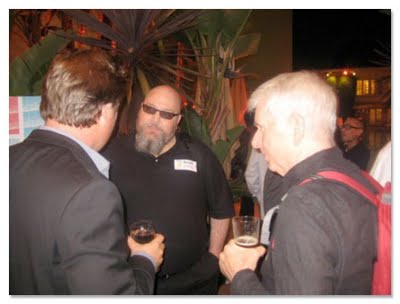
Bill Sewell, Scott Downey, Jeff Sutherland
At a recent Digital LA Scrum event, Scott Downey and I talked with Bill Sewell, CEO of Wiredrive a company that manages creative advertising. Bill has an innovative approach to using Scrum for his sales team.
Scott and I were doing a ScrumMaster course in Beverly Hills at the time and will do another on 11-12 January 2009. See link on left side of the page.
Can Scrum Help Facilitate Creative Process?
Scrum is a nicely refined way of managing people and tasks. It helps project teams assess priorities and work together. Some of the scrum methodology came from Toyota, which figured out that teams work more efficiently when they can self organize, work in shorter bursts (two week cycles), and understand their purpose clearly. Most people who use scrum are in the Web 2.0 space, but the Church of Sweden and many local governments are finding it to be a useful process, as well.
We’ve been using scrum for our development process for a while now. We use it not only in production, but in sales, customer care and support. In the advertising space, companies like the Barbarian Group are making good use of scrum in their daily operations. We would love to see other companies learning about this new process and getting on board. It might be constructive to share information and explain what we’ve learned, what works for us, and what we’ve had to modify.
Scrum principles behind creativity
At Wiredrive, we are huge fans of TED conferences. There are two TED videos that echo the sentiments of the scrum process. The first is called the Surprising Science of Motivation by Dan Pink and the second is called, Do Schools Kill Creativity? by Ken Robinson. If you are trying to solve difficult, imperceptible problems, then you need to be in a creative mindset. Most of our institutions are really good at killing creativity and instituting a factory like environment.
Not surprisingly, most motivation incentives that worked great for easy tasks actually slow people down when they are trying to solve imperceptible problems. What works best is intrinsic motivation, focusing on autonomy, mastery and purpose. This is what scrum does really well; allowing team members to self prioritize, utilize their strengths and work with a sense of purpose to achieve hyper productivity.
Jeff Sutherland has an interesting metaphor he calls “red pill, blue pill” based on the movie The Matrix. He warns people learning scrum that it’s the equivalent of Neo choosing the red pill and waking up in the bowels of a nasty spaceship, realizing that his whole existence had been an illusion. Once you have learned how to work as a self organized team, you never want to go back to being plugged in to the machine.

